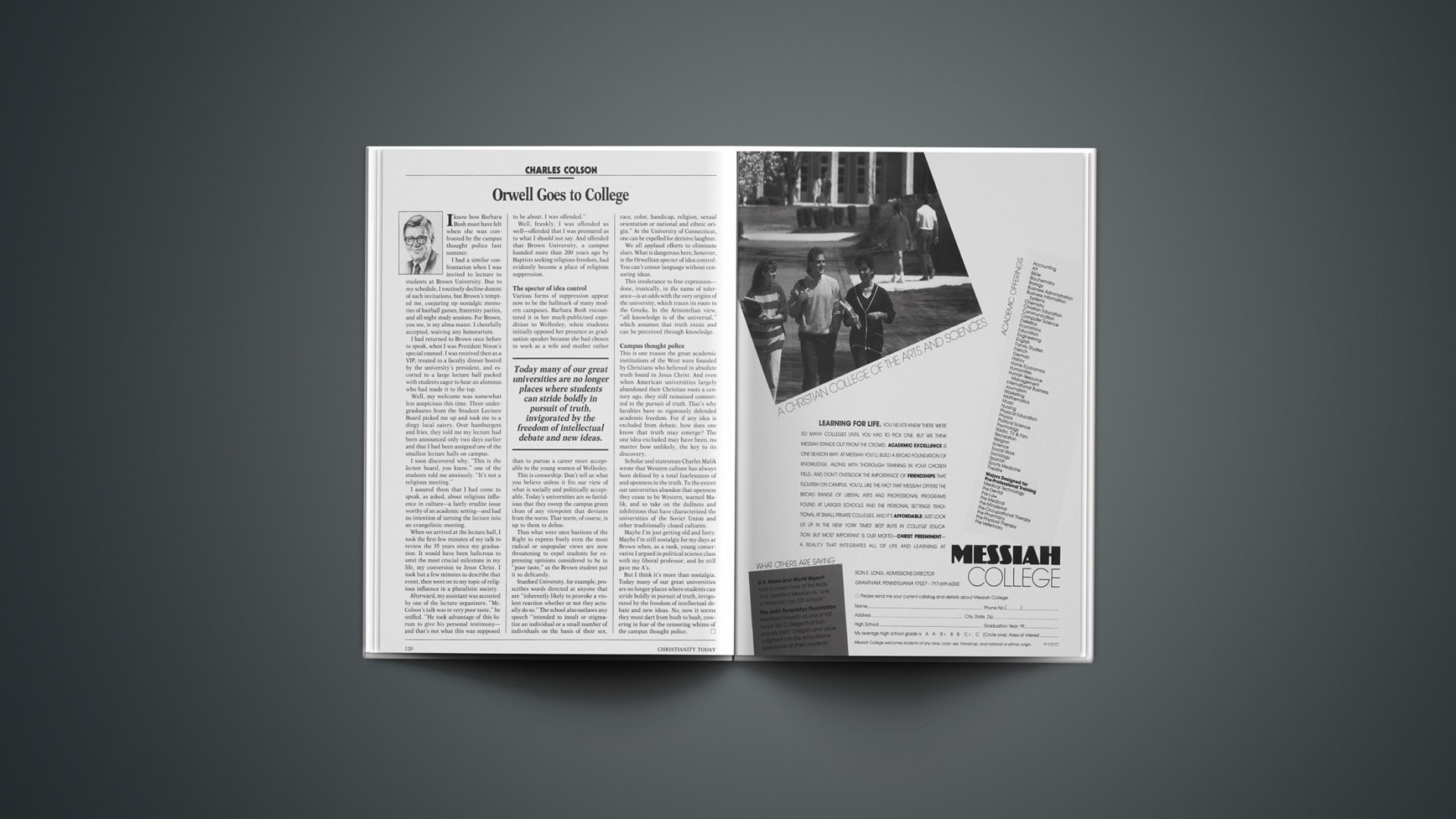I know how Barbara Bush must have felt when she was confronted by the campus thought police last summer.
I had a similar confrontation when I was invited to lecture to students at Brown University. Due to my schedule, I routinely decline dozens of such invitations, but Brown’s tempted me, conjuring up nostalgic memories of football games, fraternity parties, and all-night study sessions. For Brown, you see, is my alma mater. I cheerfully accepted, waiving any honorarium.
I had returned to Brown once before to speak, when I was President Nixon’s special counsel. I was received then as a VIP, treated to a faculty dinner hosted by the university’s president, and escorted to a large lecture hall packed with students eager to hear an alumnus who had made it to the top.
Well, my welcome was somewhat less auspicious this time. Three undergraduates from the Student Lecture Board picked me up and took me to a dingy local eatery. Over hamburgers and fries, they told me my lecture had been announced only two days earlier and that I had been assigned one of the smallest lecture halls on campus.
I soon discovered why. “This is the lecture board, you know,” one of the students told me anxiously. “It’s not a religious meeting.”
I assured them that I had come to speak, as asked, about religious influence in culture—a fairly erudite issue worthy of an academic setting—and had no intention of turning the lecture into an evangelistic meeting.
When we arrived at the lecture hall, I took the first few minutes of my talk to review the 35 years since my graduation. It would have been ludicrous to omit the most crucial milestone in my life, my conversion to Jesus Christ. I took but a few minutes to describe that event, then went on to my topic of religious influence in a pluralistic society.
Afterward, my assistant was accosted by one of the lecture organizers. “Mr. Colson’s talk was in very poor taste,” he sniffed. “He took advantage of this forum to give his personal testimony—and that’s not what this was supposed to be about. I was offended.”
Well, frankly, I was offended as well—offended that I was pressured as to what I should not say. And offended that Brown University, a campus founded more than 200 years ago by Baptists seeking religious freedom, had evidently become a place of religious suppression.
The Specter Of Idea Control
Various forms of suppression appear now to be the hallmark of many modern campuses. Barbara Bush encountered it in her much-publicized expedition to Wellesley, when students initially opposed her presence as graduation speaker because she had chosen to work as a wife and mother rather than to pursue a career more acceptable to the young women of Wellesley.
This is censorship: Don’t tell us what you believe unless it fits our view of what is socially and politically acceptable. Today’s universities are so fastidious that they sweep the campus green clean of any viewpoint that deviates from the norm. That norm, of course, is up to them to define.
Thus what were once bastions of the Right to express freely even the most radical or unpopular views are now threatening to expel students for expressing opinions considered to be in “poor taste,” as the Brown student put it so delicately.
Stanford University, for example, proscribes words directed at anyone that are “inherently likely to provoke a violent reaction whether or not they actually do so.” The school also outlaws any speech “intended to insult or stigmatize an individual or a small number of individuals on the basis of their sex, race, color, handicap, religion, sexual orientation or national and ethnic origin.” At the University of Connecticut, one can be expelled for derisive laughter.
We all applaud efforts to eliminate slurs. What is dangerous here, however, is the Orwellian specter of idea control: You can’t censor language without censoring ideas.
This intolerance to free expression—done, ironically, in the name of tolerance—is at odds with the very origins of the university, which traces its roots to the Greeks. In the Aristotelian view, “all knowledge is of the universal,” which assumes that truth exists and can be perceived through knowledge.
Campus Thought Police
This is one reason the great academic institutions of the West were founded by Christians who believed in absolute truth found in Jesus Christ. And even when American universities largely abandoned their Christian roots a century ago, they still remained committed to the pursuit of truth. That’s why faculties have so vigorously defended academic freedom. For if any idea is excluded from debate, how does one know that truth may emerge? The one idea excluded may have been, no matter how unlikely, the key to its discovery.
Scholar and statesman Charles Malik wrote that Western culture has always been defined by a total fearlessness of and openness to the truth. To the extent our universities abandon that openness they cease to be Western, warned Malik, and so take on the dullness and inhibitions that have characterized the universities of the Soviet Union and other traditionally closed cultures.
Maybe I’m just getting old and fusty. Maybe I’m still nostalgic for my days at Brown when, as a rank, young conservative I argued in political science class with my liberal professor, and he still gave me A’s.
But I think it’s more than nostalgia. Today many of our great universities are no longer places where students can stride boldly in pursuit of truth, invigorated by the freedom of intellectual debate and new ideas. No, now it seems they must dart from bush to bush, cowering in fear of the censoring whims of the campus thought police.










